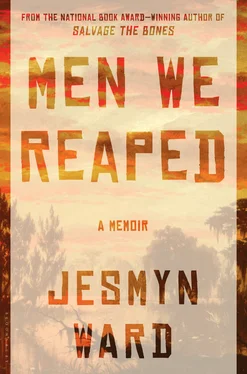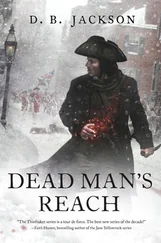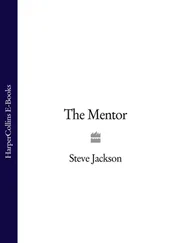My mother would have been looking at the dead eye in my father’s face, maybe seeing that the dry gray marble made the rest of him all the more terribly beautiful, and my father would have looked at my mother’s small, slender arms and legs and been reminded of a doe. The pines would have reached up and away on both sides of the road, and my parents would not have said hello when they first met each other. My father would have kicked dirt into the ditch. My mother would have picked up a rock. They knew kids in common, their cousins, and other friends. This was and still is a small town.
In 1969, when my father was thirteen and my mother eleven, Hurricane Camille hit. It flattened everything, wiped away the landscape with an indomitable hand. I imagine everyone in south Mississippi must have thought the world was at an end. Camille was only one in a staccato succession of tragedies in those days. Southern Mississippi boys, Black and White, died in Vietnam, cities all over the United States imploded in riots, and churches were bombed. Crosses burned. Freedom Riders tried to register folks to vote, and in Mississippi, the rivers and bayous were watery graveyards. Locally, Black men and women were demonstrating on public beaches where they were not allowed to sunbathe and swim. In return, they were being attacked by dogs and policemen. They must have thought the end times had come when Hurricane Camille, a Category 5 storm, bore down on them, killing more than 250 people, drowning a family of thirteen who’d searched out shelter in a Catholic church in Pass Christian. The hobbled authorities put families in tent cities. After my grandmother Celestine’s house was lifted from its foundation and displaced by the storm surge that leveled Pass Christian, my father and his sisters and mother stayed in one such tent city. My grandmother Dorothy’s house was spared, since it sits farther up in DeLisle in a part that we call the Chaneaux, which is distant enough from the DeLisle Bayou to escape the surge. My mother’s family provided water for the entire town when people learned that there was an artesian spring in their yard.
After Hurricane Camille hit, the government also offered hurricane survivors the chance to relocate elsewhere. My father’s family was given the option of moving from Pass Christian to Oakland, California, so they left. This same trend of relocating those affected by major hurricanes would occur decades later, when Hurricane Katrina ravaged the Mississippi Gulf Coast, and instead of being given the tools they needed to help rebuild home, families were offered one option: relocation. Escape. My father and his mother and siblings fled from the memory of their house rocking off its foundation while they swam to say alive in the attic. In Oakland, the Black Panthers fed him breakfast before school, and during the summers his family drove to Mississippi for visits. For all of us, the pull home is an inexorable thing. During his Mississippi summers, my father hung out with his cousins and extended family, and sometimes, I’m sure, with my mother.
My father grew solid and his pectorals were so well muscled they looked striated like clam shells. In the Bay Area, he took kung fu, and his first master taught him how to fight honestly, mean: First, punch them in the nose . Daddy was a natural; when jumped by three hustlers after a three-card monte game gone wrong on a city bus, he beat them all. He joined a gang. He dated plenty of girls: he was handsome and charming and funny, muscular and artistic.
In some ways, both of my parents were given adult responsibility too early, a necessity of growing up in fatherless households. Those shy children they’d been on St. Stephen’s when they met had grown and changed in their teenage years. My grandmother Celestine treated my father as the man of the house and the family, as an adult equal, since she’d married and divorced his father, my grandfather Jerry, and was raising her children on her own. For years, my father was the only boy in the house, and he was the second-eldest child. He called my grandmother Celestine “Mama” sometimes, and other times he called her “Lady,” and from him it sounded like an endearment, an address of devotion from an equal. This meant he had the freedom to explore Oakland and the Bay Area, to experiment with drugs, to do some petty hustling.
Just as my father was the father figure in his family, the older boy of two and the second-oldest child, my mother was the mother figure in her own family. My mother wasn’t accorded the kind of freedom my father was granted because of his gender. Instead, since my grandmother Dorothy worked two or three jobs to support her seven children on her own, since she spent her days working as hard, physically, as any man, the role of mothering the seven children fell to my mother. After several years of marriage, my grandfather Adam divorced my grandmother to marry her friend. So my mother learned to cook before she turned ten, and spent the rest of her preteen and teenage years preparing large breakfasts of oatmeal and biscuits, and larger dinners of red beans and rice. When my four uncles, the youngest of the seven children, broke my grandmother’s rules my mother whipped them with switches peeled from trees in the yard. She and her two sisters washed loads of laundry and hung them out to dry on lines stretched across the length of the swampy backyard.
This set my mother apart from her siblings: she was one of them, and not. The role she assumed made her lonely and isolated her, and her natural shyness complicated this. She resented the strength she had to cultivate, the endurance demanded of women in the rural South. She recognized its injustice, even as a child. This made her quiet and withdrawn. By the time she was a teenager and her siblings old enough to not need her constant supervision, my mother was able to act her age, and she dated, frequented the hole-in-the-wall club her godfather owned, and threw a few house parties that her peers still talk about today.
Still, she felt the confines of gender and the rural South and the seventies stalking her, felt that specter of DeLisle out in the darkness, the wolf cornering her in her mother’s house, which had no heat in the winter, no air in the summer. She was relieved when she graduated from high school and traveled to Los Angeles to live with relatives on her father’s side to go to school. This was a rare opportunity for her, and even though she was aware of how rare it was, how tenuous, the dream of my father called to her in Oakland. After a semester of study, she headed north to the Bay Area to join my father. He had courted her with letters and pictures sent from Oakland and with charm and muscled beauty when he saw her during the summers he visited Mississippi. This is how they began their lives together.
Roger Eric Daniels III. Born: March 5, 1981. Died: June 3, 2004
Ann Arbor was gray. The sky was always overcast, blanched sooty and cold, even though it was spring and the trees had bloomed bright green. I was miserable with allergies. I’d just finished the first year of my two-year graduate program, and my nose was running so badly I could only breathe out of my mouth. I’d never had allergies like that before my time in Michigan, and having them then made me feel as if the very landscape in Michigan hated me, as if I were a foreign body it was attempting to eject.
My cousin Aldon flew into Detroit to help me drive from Michigan to Mississippi for the summer of 2004. Joshua was a month older than Aldon, and we’d grown up as close as siblings. As I was twenty-seven, he had grown into my big cousin at twenty-four, dwarfing me by seven inches. He had a gold tooth, braids cornrowed thickly to his head, and everything about him was capable and kind, so when he took the driver’s seat for the first leg of the fifteen-hour drive, I hunched over in the passenger seat, glared at the miles of highway, fields, and billboards before us, and was grateful and apprehensive. I would like to breathe again , I thought, but I was going home. My homesickness always meant that the thought of going home was exhilarating and comforting, but over the past four years, that sense of promise had turned to dread. When my brother died in October 2000, it was as if all the tragedy that had haunted my family’s life took shape in that great wolf of DeLisle, a wolf of darkness and grief, and that great thing was bent on beating us. By the summer of 2004, three of my friends had died as well: Ronald in the winter of 2002, C. J. in January 2004, and Demond a month later, in February. Each friend’s subsequent death was a hard blow, as that wolf hunted us. But I didn’t say this to Aldon. Instead, I said: “I can’t breathe, cuz. It’s the air.”
Читать дальше












